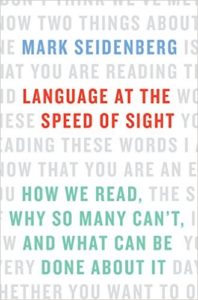We have been hearing and telling that making kids read books is very important. That it is a good habit. But more than a good habit, it is a necessary skill and one that is just as important, if not more, as Math skills. Because your comprehension skills will more or less control what you learn through your college and how well you perform in complex jobs – STEM or others. But that is not all, ability to read and comprehend will also influence every decision you make in your life, from selecting the best option for your car to picking the right treatment and insurance policy. In Language at the Speed of Sight, Mark Seidenberg lays out the current state of reading skills in the US and goes digging all the way to School of Education and points finger at teacher training to find ways to fix reading problems.
Mark Seidenberg is the Vilas Research Professor and Donald O. Hebb Professor in the department of psychology at the University of Wisconsin-Madison and a cognitive neuroscientist who has studied language, reading, and dyslexia for over three decades.
Language at the Speed of Sight: How We Read, Why So Many Can’t, and What Can Be Done About It
Author: Mark Seidenberg
Hardcover: 400 pages
Publisher: Basic Books; 1 edition (January 3, 2017)
ISBN-10: 0465019323, 978-0465019328
Language at the Speed of Sight Summary
The author begins with a primer on history of the written word and how language evolved over centuries. It is fascinating that humans came up with a system and a data bank to associate everything that they see, feel, and do to be expressed in complex combination of alphabets and syntax to communicate simple and complex things.
After a comprehensive discussion on origin of written word and different writing systems used across the world, the author then examines process of reading and comprehension. He further talks about brain physiology and neural communication involved in transferring the printed ink to forming a meaning. A lot of stress is also given on reading disabilities like Dyslexia and other factors that make reading difficult for a considerable population, in this part of Language at the Speed of Sight. If you club these students with those who come from an economically backward background and from families that do not have educated parents, the number gets considerably high.
The author then cites America’s poor performance in reading skills at the International level, which barely crosses the average mark of 493 and is almost as bad as the math skills. He also points out that reading is not something that is stressed at early school levels and the slow progress is often glossed over. He talks about various teaching theories implemented in schools currently that actually work against improving reading skills.
Language at the Speed of Sight then moves to analyzing the reasons that have brought the US and the world to this place where reading skills have been deteriorating. Part of this problem could be the rapid accessibility of audio-visual media and lower attention spans. But he points out a major portion of responsibility also lies on the school teachers.
His solution to the problem is training teachers in the science of reading. Equipping those who attend School of Education with the knowledge of reading science will help them tackle reading problems at a young age.
Language at the Speed of Sight Reviews
Language at the Speed of Sight reviews have been largely positive. Readers and reviewers agree the the problems outlined by mark Seidenberg are serious and teaching to read should be a skill that must be taught at school of education.
“Mr. Seidenberg’s book won’t end the debate between scientists and the educational establishment over how children should learn to read, but it should jump-start an overdue conversation.” ~ David Kipen, New York Times
“A worthy primer on the science of comprehending language at the visible, symbolic level of print, a place that requires plenty of brain power and years of practice to navigate.” ~ Kirkus Reviews
Seidenberg’s analysis is backed up by numerous studies and tables of data. His approach is pragmatic, myth-destroying, and rooted in science—and his writing makes for powerful reading. ~ Publisher’s Weekly
Mark Seidenberg on Cognitive Neurocience and Reading
Mark Seidenberg talks about cognitive neuroscience and reading skills.
